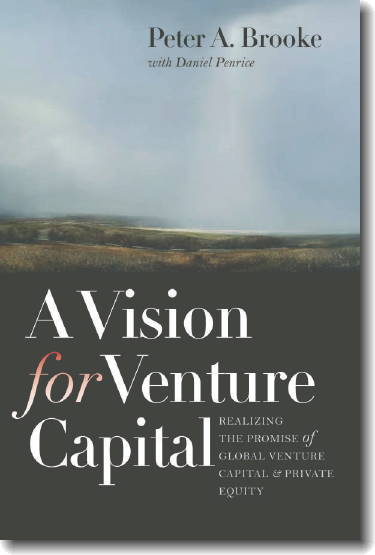A Vision For Venture Capital
 Sunday, April 4, 2010 at 4:36PM
Sunday, April 4, 2010 at 4:36PM

I recently finished reading A Vision for Venture Capital: Realizing the Promise of Global Venture Capital and Private Equity. The book is an (assisted) autobiography chronicling the storied career of Peter A. Brooke. As founder of TA Associates and Advent International, Mr. Brooke was crucial to the early development of the venture capital industry - he was truly a pioneer for the industry not only in the U.S. but in his work spreading the venture capital model internationally.
The book is split into two parts. The first half of the book takes you through his career – his development as a venture capitalist, building TA Associates, and then his shift in focus to international investments and the founding of Advent International. The second half of the book covers how to add value through venture investing and Mr. Brooke’s outlook for the future. If you don’t have time to read the whole book, I highly recommend the second part - there are some great takeaways and you still get many anecdotes from his storied career.
It was clear that Mr. Brooke is passionate about the true role of venture capital and it was a point he drove home throughout the book. Below is an excerpt that I felt exemplified Mr. Brooke’s ideology.
When discussing the industry’s early moves into international markets and the difficulty getting U.S. based investors to see potential Mr. Brooke said:
“It didn’t seem to have occurred to many venture capitalists and private equity managers that they could be a force for economic and social progress in the world. To me, however, this is the whole point of what we do. The frontier in the industry is wherever the skills of venture capital and private equity managers can be applied to address economic problems such as poverty, underdevelopment, and lack of opportunity, along with the many social ills associated with them. To put it another way, the pioneers today are those who apply their entrepreneurial spirit and problem-solving skills not only to make a profit for their investors and themselves but also to improve the lives of others.”
What’s often lost on many people in the private equity and venture capital industries is that there can be more to investing than just monetary gains. Plenty of good can come from helping develop companies and markets, of course there is always room for rewards but that should not be the sole focus – Mr. Brooke really hammers this point home in his book.
Overall, I think it’s a great read, especially for those starting out or considering a career in venture capital or private equity. You get a lot of history on the industry’s development and can really broaden your mindset on how to approach investing. The book is also great for those involved with venture capital and private equity investing in the emerging markets. Underdeveloped, frontier markets arguably stand to benefit the most from private equity and venture capital investment and it’s sure to be where much of the industry’s growth comes in the coming years. Approaching these markets with some of Mr. Brooke’s insights and lessons would surely be beneficial.
